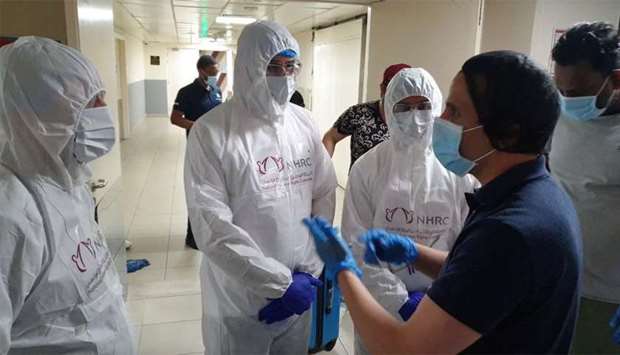*Monitoring team visits quarantine facilities in Industrial Area, Umm Salal and Mesaieed and hotels housing residents subjected to compulsory quarantine
The field visits and monitoring team of the National Human Rights Committee (NHRC) has visited workers in some parts of the Industrial Area that were subjected to quarantine, several quarantine places for workers in Umm Salal and Mesaieed, and some hotels designated for quarantine, to identify the precautionary measures followed there and the quality of health services provided to reduce the spread of coronavirus (Covid-19).
This is part of the continuation of the NHRC's visits programme, which in the previous stage, included penal institutions and places of detention. The programme will continue during the coming days to include many more institutions and bodies concerned with the application of precautionary measures approved by the official authorities to contain Covid-19.

On the goals of the visit to some parts of the Industrial Area that were subjected to quarantine, Vice-Chairman of NHRC and chairman of the field visit and monitoring committee, Dr Mohamed Saif al-Kuwari, said that based on NHRC's concern for the health and safety of workers, and everyone who lives in Qatar, it visited the various places of major human gatherings to inspect the precautionary measures followed, as per the tasks entrusted to it, and in implementation of the regulations and laws that regulate the work of the committee.
Dr al-Kuwari explained that the NHRC has obtained extensive information about the number of workers in some parts of the Industrial Area that were subjected to quarantine, the size of housing facilities, the conditions of residence and housing of workers, shelter services, and the quality of healthy food and nutritional supplements provided to workers in quarantine in the region, especially to those with chronic diseases, and the elderly.

During the visit to Industrial Area, the NHRC team inspected the distribution points of the food baskets for workers, the mechanism of work, and distributed some necessary health supplies, including free sterile bags and masks for workers to prevent the spread of the epidemic, he added.
Dr al-Kuwari pointed out that the monitoring committee team also briefed officials during the meetings on the implementation of the precautionary measures approved by the Atate in some parts of the Industrial Area that were subjected to quarantine, especially sterilisation and cleaning operations that the region has been subjected to since the start of the application of the quarantine, and health services provided to residents and workers.
Dr al-Kuwari added that the team was briefed on the procedures used to treat people infected with the virus, the preventive medical equipment provided for workers to protect them from the risk of transmission of the virus, including the procedures used to isolate the infected and those who had contact with them, and the plans taken to ensure that the epidemic does not transmit within the Industrial Area.
About the quality of healthcare provided to infected workers, Dr al-Kuwari said that the team reviewed the work of the mobile inspection units inside the Industrial Area, which are responsible for examining those living there, and the mechanisms used to conduct examinations, as well as reviewing the process of distributing masks and sterilsers, in addition to visiting several commercial complexes, food stores, pharmacies, and open exchange offices in the Industrial Area.

The officials of the Industrial Area have informed the team that the medical centres distribute the medicine free of charge to the needy, and the visit was an opportunity to know about the preparation of a new emergency field clinic that will open soon, he added.
Meanwhile, the NHRC team also visited the quarantine centres for workers infected with coronavirus in Umm Salal and Mesaieed.
Dr al-Kuwari said that the team spoke to officials and patients in the centres, and listened to extensive explanations about a number of patients and the general situation inside quarantine areas and the needs of the isolated persons. The team noted great care in terms of attention, accommodation, hygiene, and other additional services, as well as ensuring no overcrowding in the rooms.
In the Umm Salal quarantine centre, the team was briefed about the medical services provided there. A team of 45 people from various medical specialties provide care at the centre to ensure close follow-up of any case of infection among the workers since the diagnoses of the infection until completion of treatment.
Dr al-Kuwari noted that the workers' residence areas are provided with laboratories and medical care rooms that include a sufficient number of beds, oxygen tubes, and artificial respirators, if needed, in addition to isolation areas between patients. Places for entertainment and exercise and sports were also provided in order to maintain the psychological health for residents of those centres. The team was also briefed on the services provided to protect the guards and supervisors at the workers' residence areas, and made sure that they received all health services and medical checks required for doctors and workers.
During the visit, the team also took a closer look at the precautionary measures followed in the hotels which receive the residents subjected to compulsory quarantine decision from the first moment until they leave after ensuring their safety and not being infected with the pandemic, al-Kuwari added.
He noted that the team listened to comprehensive explanations on the health services provided to the residents, and the strict precautionary procedures followed by the hotel management to prevent mixing and ensure required distancing, as well as the services provided to clean the rooms, the quality of healthy food, ventilation in the rooms, laundry and other health services necessary for the safety and security of the residents.
Dr al-Kuwari said that workers in some parts of the Industrial Area subjected to quarantine, as well as those in workers' residence areas visited by the NHRC team and the residents in the hotels were given the hotlines of the National Human Rights Committee and were urged to contact whenever needed.

